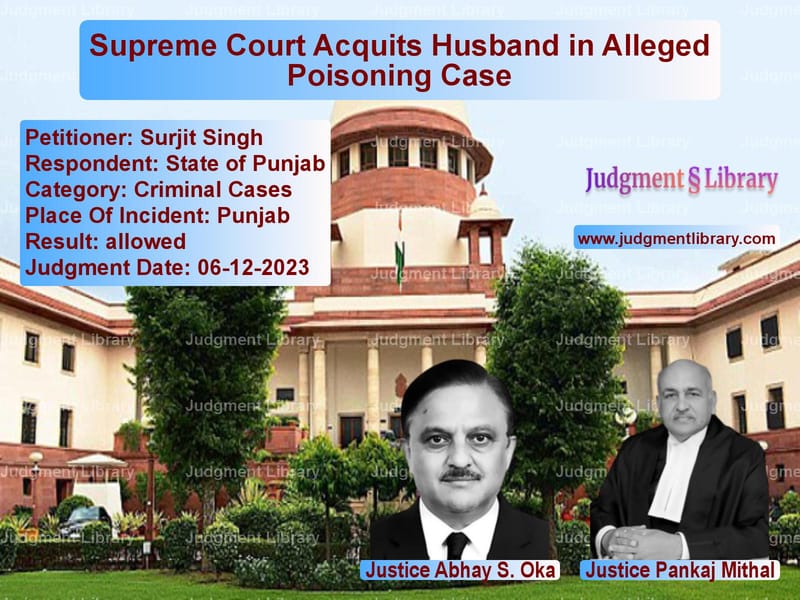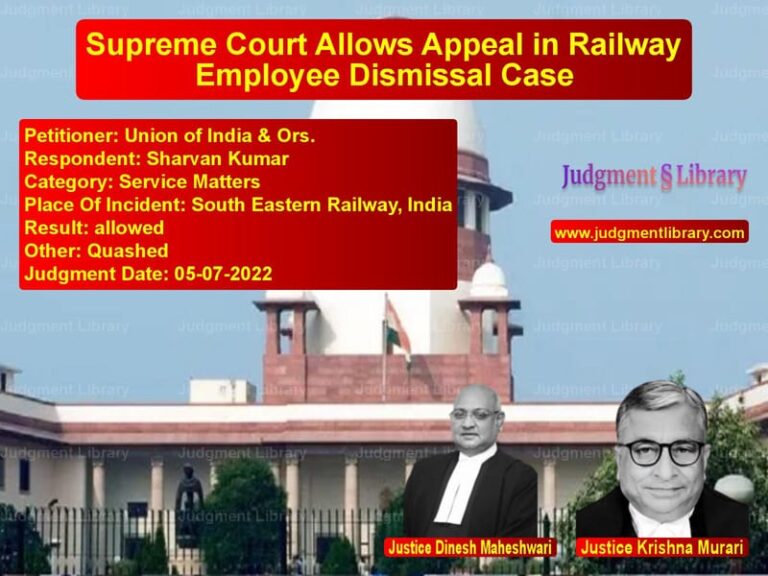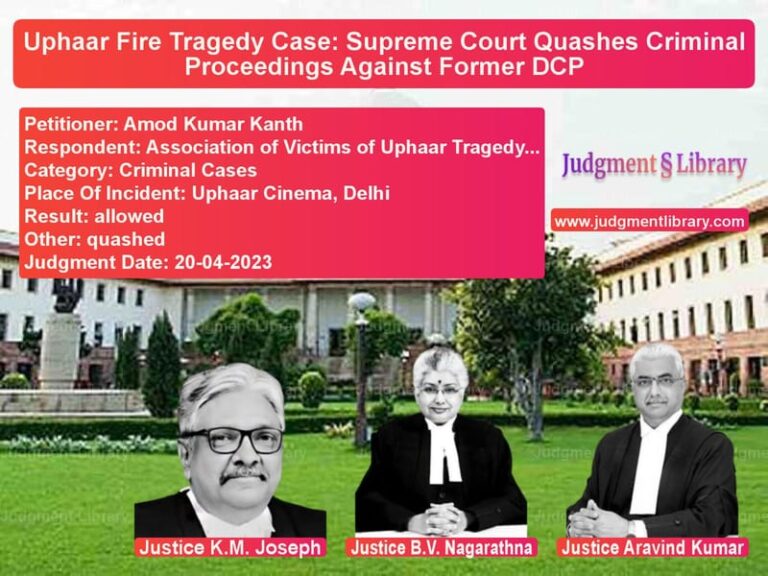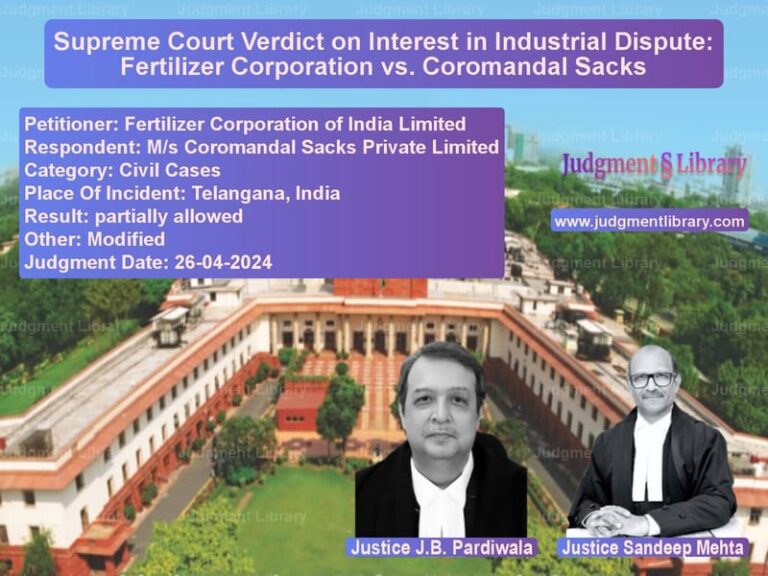Supreme Court Acquits Husband in Alleged Poisoning Case
The Supreme Court of India recently delivered a significant judgment in the case of Surjit Singh v. State of Punjab, overturning the conviction of the appellant, Surjit Singh, who was sentenced to life imprisonment under Section 302 of the Indian Penal Code (IPC). The case revolved around the alleged poisoning of the deceased, his wife, and the reliability of her dying declarations.
Background of the Case
Surjit Singh was convicted by the Trial Court for allegedly administering poison to his wife. The High Court upheld the conviction. The prosecution’s case relied heavily on the dying declaration of the deceased, recorded by police officer Surjit Singh (PW-10). However, the appellant argued that the deceased’s earlier statement to Dr. Manvir Gupta (PW-13) contradicted this, as she had stated that she consumed poison herself following a quarrel with her husband.
Read also: https://judgmentlibrary.com/supreme-court-upholds-conviction-under-section-34-ipc-in-murder-case/
Key Issues Before the Supreme Court
- Was the dying declaration recorded by the police reliable?
- Did the evidence of Dr. Manvir Gupta, who testified that the deceased had confessed to self-poisoning, outweigh the prosecution’s version?
- Was there procedural lapses in the recording of the dying declaration?
- Did the prosecution fail to prove the case beyond a reasonable doubt?
Arguments of the Appellant
- The appellant argued that the prosecution’s case was based solely on the dying declaration recorded by the police officer (PW-10), which was not corroborated by medical evidence.
- The first dying declaration given to Dr. Manvir Gupta (PW-13) indicated that the deceased had consumed poison on her own after an argument.
- The doctor who allegedly certified the deceased’s fitness to give a dying declaration before the police officer was not examined.
- The police officer himself admitted in cross-examination that the doctor refused to certify the fitness of the deceased when her statement was being recorded.
Arguments of the Respondent (State of Punjab)
- The prosecution contended that the dying declaration recorded by the police officer (PW-10) should be given more weight as it was recorded in a hospital setting.
- The statement of the deceased’s mother (PW-7), who supported the prosecution’s case, should be given due importance.
- The Trial Court and High Court had already found the police officer’s dying declaration credible.
Supreme Court’s Observations
1. Dying Declaration Before Doctor v. Police Officer
The Court noted that the first independent person to whom the deceased gave a statement was Dr. Manvir Gupta (PW-13), where she stated that she had consumed poison herself. The doctor was a prosecution witness and was not declared hostile, meaning his testimony was credible.
2. Absence of Fitness Certificate for the Dying Declaration
The police officer (PW-10) recorded the dying declaration but admitted that the doctor present refused to certify the deceased’s fitness during the recording. The Supreme Court held that this was a significant lapse, making the statement unreliable.
3. Non-Examination of the Certifying Doctor
The Court observed that the prosecution failed to examine the doctor who had supposedly declared the deceased fit to give a statement before the police officer. The absence of this key testimony led the Court to draw an adverse inference against the prosecution.
4. Conflict Between Two Dying Declarations
Given that the deceased had made two different statements—one before the doctor and another before the police—the Court ruled that the benefit of doubt must go to the accused.
5. Lack of Independent Corroboration
The Court emphasized that the only direct evidence against the accused was the dying declaration recorded by the police officer. Since this was contradicted by the deceased’s statement to the doctor, the conviction could not stand.
Final Judgment
- The Supreme Court acquitted the appellant.
- The conviction and sentence were set aside.
- The Court ruled that the prosecution failed to establish guilt beyond a reasonable doubt.
Key Takeaways
1. Reliability of Dying Declarations
This case highlights that dying declarations must be recorded with proper procedural safeguards, including fitness certification by a doctor.
2. Importance of First Statements
The Court gave precedence to the deceased’s first statement made to an independent doctor over the one recorded by the police.
3. Benefit of Doubt in Criminal Cases
If two possible interpretations arise from evidence, the benefit of doubt must be given to the accused.
4. Need for Corroboration
A sole dying declaration without corroborating medical or forensic evidence may not be sufficient for conviction.
Conclusion
The Supreme Court’s ruling in this case reinforces the fundamental principle that the prosecution must prove guilt beyond a reasonable doubt. In cases where conflicting dying declarations exist, courts must carefully assess which version is credible. This judgment sets a precedent on the evaluation of dying declarations and ensures that procedural lapses do not lead to wrongful convictions.
Petitioner Name: Surjit Singh.Respondent Name: State of Punjab.Judgment By: Justice Abhay S. Oka, Justice Pankaj Mithal.Place Of Incident: Punjab.Judgment Date: 06-12-2023.
Don’t miss out on the full details! Download the complete judgment in PDF format below and gain valuable insights instantly!
Download Judgment: surjit-singh-vs-state-of-punjab-supreme-court-of-india-judgment-dated-06-12-2023.pdf
Directly Download Judgment: Directly download this Judgment
See all petitions in Murder Cases
See all petitions in Bail and Anticipatory Bail
See all petitions in Custodial Deaths and Police Misconduct
See all petitions in Judgment by Abhay S. Oka
See all petitions in Judgment by Pankaj Mithal
See all petitions in allowed
See all petitions in supreme court of India judgments December 2023
See all petitions in 2023 judgments
See all posts in Criminal Cases Category
See all allowed petitions in Criminal Cases Category
See all Dismissed petitions in Criminal Cases Category
See all partially allowed petitions in Criminal Cases Category







